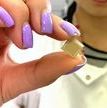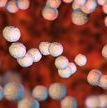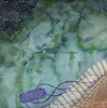- Infectious disease ×
-
Patching up pandemic preparedness: a needle-free approach to influenza vaccination
December 15, 2025
Chris McMillan and Chloe Entriken of the University of Queensland, Australia, take us behind the scenes of their latest publication 'Improved efficacy of an influenza DNA vaccine through high-density microarray patch delivery' published in the Journal of General Virology.
-
Strep A: what you need to know
December 6, 2022
With a notable increase in serious Step A cases in the UK this year and concern over the risk to young children, we asked three expert Microbiology Society members to answer some common questions about Strep A.
-
Podcast: Inside the creeping threat of fungal infections
November 23, 2022
Some fungal infections, like athletes' foot or thrush, are relatively common and are usually not serious. But in those with underlying conditions or compromised immune systems, fungal infections can be deadly.
In recent weeks, the World Health Organisation has warned of the serious threat that fungi pose to humans with a new report and list of priority fungal pathogens. In this episode of Microbe Talk, Charlotte takes a look inside the creeping threat of fungal infections with guests Prof Kevin Kavanagh and Prof Neil Gow.
-
Microbiology Editor’s Choice: Vibrio cholerae; a siderophore pirate
December 1, 2020
Each month, a manuscript published in our flagship journal Microbiology is chosen by a member of the Editorial Board. This month, the paper is titled ‘Siderophore piracy enhances Vibrio cholerae environmental survival and pathogenesis’ and was chosen by Dr Andrew Preston.
-
Microbiology Editor’s Choice: how do flagella interact with host membranes?
November 3, 2020
Each month, a manuscript published in our flagship journal Microbiology is chosen by a member of the Editorial Board. This month, the paper is titled ‘The interaction of Escherichia coli O157:H7 and Salmonella Typhimurium flagella with host cell membranes and cytoskeletal components’ and was chosen by Dr Hana Sychrová.
-
Life after a pandemic: What we can learn from the Spanish flu?
July 30, 2020
With the slow return to a new ‘normality’, it is hard to know what life will be like out of lockdown. A direct comparison to the current situation with SARS-CoV-2 (the virus that causes COVID-19) is the Spanish influenza pandemic of 1918. Spanish flu affected a staggering one-third of the world’s population and killed 50 million. As much as the two viruses are very different, the societal reactions during both pandemics are similar, and our way of coping with COVID-19 can be understood by reflecting on the measures used 100 years ago.
-
FIS 2019: Improving the dialogue between health-related professionals and career scientists
December 19, 2019
Over 600 delegates attended the Federation of Infection Societies (FIS) 2019 in November this year. The meeting, hosted by the Microbiology Society, was held in Edinburgh and provided a unique interface for delegates from diverse backgrounds, all with an interest in infection, to interact.
-
To notify, or not to notify – that is the question
October 23, 2019
In this blog, Professor Garry Blakely, from the University of Edinburgh's School of Biological Sciences, discusses carbapenemase-producing bacteria and the importance of surveillance. In August 2019, Professor Blakely attended a Public Health England (PHE) steering group with a number of clinicians and diagnostic staff to discuss the limitations and effects that reporting infections from carbapenemase-producing bacteria could have on healthcare systems.








